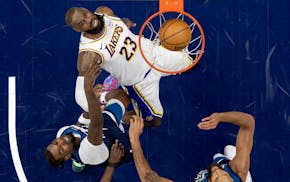Brock Stewart, the Twins reliever, surrendered back-to-back hits after he entered in the middle of an inning with a four-run lead against the Tigers last month. The next batter was future Hall of Famer Miguel Cabrera, who represented the go-ahead run.
Twins pitching coach Pete Maki walked to the mound before Stewart's matchup vs. Cabrera with a simple message.
"See you in the dugout in 30 seconds," Maki told Stewart. "You're going to throw a sinker here and get a double play."
It took closer to a minute, but Stewart needed to throw only two sinkers before he induced an inning-ending double play in a 4-1 victory. Not everything Maki says turns out exactly as he predicted, but 12 months after Wes Johnson abruptly left the Twins to become the pitching coach at LSU, Maki has helped turn the Twins into one of the best pitching staffs in baseball.
“It's a results-driven business, but we try to get them to focus on things that lead to those results. ... We're doing a great job of that. ”
The Twins, as a team, rank third in the majors in ERA (3.68), third in strikeout rate (9.62 per nine innings), third in walk rate (2.82 per nine innings), and first in fielding independent pitching (3.70). It's a huge jump for a team that ranked around the league average in all those categories last year.
"He works hard," Sonny Gray said of his pitching coach. "He's very routine- and schedule-oriented, which really works well with me because I work the same way. Information on the opposing hitters, he's very good at that. He'll listen to your thoughts too, and entertain your suggestions. It's not his way or the highway."
Maki, 40, who was in his third season as the Twins' bullpen coach when he was promoted last summer, was quick to credit bullpen coach Colby Suggs, assistant pitching coach Luis Ramirez, minor league coaches and advance scouts for the team's success.
A former college coach at Duke and Columbia, Maki has maintained the same pitching philosophy through all his stops. The stat he closely tracks is called "early and ahead." He wants his pitchers to reach two strikes in the first three pitches of an at-bat, or have the batter put the ball in play regardless of the result. The goal is doing that for 75% of their at-bats.
"It's process-oriented. You give up a 0-0 homer, that counts as early and ahead," Maki said. "It's a results-driven business, but we try to get them to focus on things that lead to those results. … We're doing a great job of that. I think we have four starters in the top 15 in major league baseball. Joe Ryan is leading major league baseball in throwing two of the first three pitches for strikes or getting the ball in play early."
With those goals in mind, Twins starting pitchers lead the league in innings pitched (517) and they have the third-lowest walk rate among rotations. The Twins' pitching success starts with their talent, but Maki found ways to help them improve.
“Information on the opposing hitters, he's very good at that. He'll listen to your thoughts too, and entertain your suggestions. It's not his way or the highway. ”
The first time Maki sat down with Pablo López in spring training, he suggested López add a breaking ball against righthanded batters. López, without telling Maki beforehand, was thinking the same thing after an offseason visit to the Driveline training facility near Seattle. That initial conversation turned into López's sweepy slider, and his strikeout rate is now at a career high.
"They want to be good," Maki said. "They want to get paid. They want to win games. It's our job to give them the most important pieces and to make sure it's presented in a way that makes sense. Try to use one-syllable words when you could use a three-syllable word, right?
"They want to know what their strengths are and what they need to do to have success. I'd like to think we're OK at that."
Maki was put in a tough position last year, assuming the pitching coach role midseason. The Twins still keep in touch with Johnson — members of the coaching staff had a watch party for one of LSU's College World Series games — but a full offseason and spring training with Maki was instrumental for the second-year pitching coach.
"I think he's flourished," Twins manager Rocco Baldelli said. "He's showing all the different sides of him."

Podcast: Patrick Reusse on an unbelievable weekend at Target Center
Analysis: Loons discover there's a chunky gap between them and MLS' best

High school flag football becomes real as games begin, enthusiasm reigns

Scoggins: Redick's no-sub second half looked desperate, appears damaging

